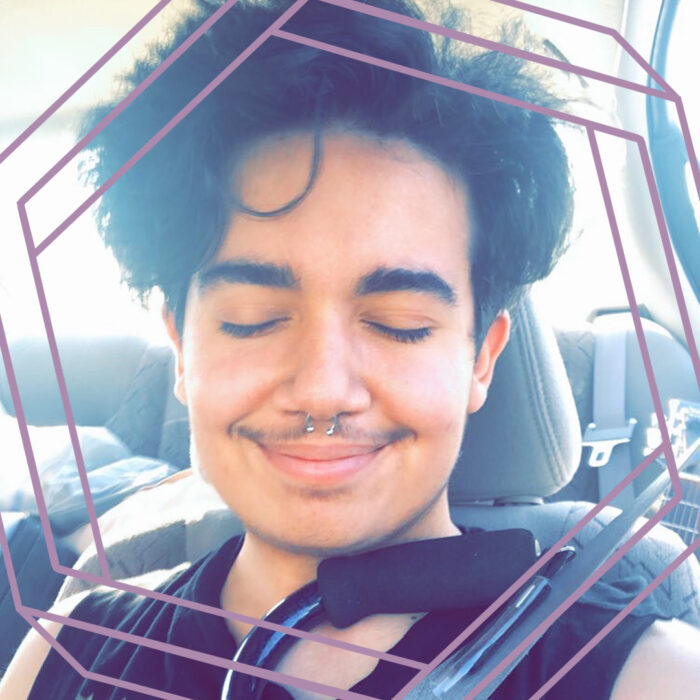76 – Krystal
Description
 </figure>
</figure>Krystal Vasquez talks hypermobility, mast cells, and CSF leaks.
Transcript
Brianne: I’m Brianne Benness, and this is No End In Sight, a podcast about life with chronic illness.
[guitar riff]
Drew: Hey, this is associate producer Drew Maar. Before we get started, here’s a quick reminder that you can find No End In Sight on Patreon, which is a really simple way for listeners to subscribe to support the show financially on a monthly basis. So if you’ve been enjoying the podcast and you also have a couple bucks to spare, we’d be so so grateful if you’d sign up as a patron at patreon.com/noendinsight. Today we’ll be talking with Krystal Vasquez about hypermobility, mast cells, and CSF leaks. A couple of content notes for this episode: There’s a mention of food tracking around 32 minutes in, and COVID is mentioned a couple of times throughout the episode with a discussion surrounding infection risk at the 45 minute mark. Before we start, here’s our disclaimer: This podcast is not intended as a substitute for professional medical advice, diagnosis or treatment. Make sure you talk to your practitioner about any questions or symptoms.
[guitar riff]
Brianne: So I like to start just by asking people, how was your health as a kid?
Krystal: So I always thought that I was like, a super healthy child.
And all doctors were always like, “Oh, she’s so healthy.” And like, “It’s fine.” It wasn’t necessarily fine. It wasn’t necessarily like, anything that bothered me on a day-to-day basis, but like, having like, lots of headaches as a teenager, my knees always hurt with weather changes, and my mom usually pushed it off as like, “Oh, that happens to everyone.” And I’m like, “Does it though?”
Brianne: Yeah. “Really?” But like, perhaps it happened to your mom.
Krystal: Right. Like, it was probably normal for her, but it wasn’t normal for like, the general public. I also had a lot of like, weird presyncope spells, which they usually say like, you get as a teenage girl for some reason. But it didn’t really go away. It’s gotten to the point where I… so I never actually faint, but I can… when my vision blacks out, I can still like, migrate to my next destination pretty well. And I feel like that’s a skill.
Brianne: Yeah. There’s like a level of stasis that you can find where you’re like, “Okay, well, my eyes aren’t working anymore, but my legs are still… like, my arms and legs are still responding. So if I can just get myself to a safe location, I don’t need to see for the next…” But it’s like, you’re right. It is a little bit of a gamble.
Krystal: Yeah, but like, I thought that was normal. Like, people just do that and I’m like, “Oh, it’s not.” Also like, sitting in the shower isn’t a normal thing. I’ve sat in the shower, like the floor of the shower since I was little. Like, showers are exhausting if I don’t sit.
Brianne: Right. Yeah. And they are. But like, as a kid, especially stuff like bathing, I think, where like, you probably only know your immediate family’s habits and like, maybe somehow a couple other close friends or something. We’re not all talking about our shower postures every day, like at public school or something. You just wouldn’t even know.
Krystal: Yeah I’m just like, “Why wouldn’t people sit in the shower? It’s so much more comfortable and easy.”
Brianne: “Don’t they get dizzy?”
Krystal: “Don’t they get tired? Like, isn’t the water like, too hot for them?” Yeah. Those things.
Brianne: Yeah. Yeah. So you had like, what we would maybe say like, idiosyncrasies that at the time you didn’t know were perhaps unusual or meaningful, sounds like.
Krystal: Right. And I also sit really weird. So you can’t see it now, but I’m like in a ball.
Brianne: Yeah, me too. I’m like, this is my knee right here at the bottom of the camera.
Krystal: Yeah. So I’ve always sat really oddly, I guess. Which, I don’t know, people just thought, “Oh, Krystal’s just weird. It’s fine.” But I’m learning that that’s probably to help my hips feel comfortable and to help my body stay upright.
Brianne: Yeah. Yeah. I’ve been learning so much about that, the last few weeks even. And it’s like, “Oh, people who may or may not be a hypermobile, like, our postures are really going to be correcting differently.” And like, some of these habits might anecdotally turn out to be really big patterns and people with this body stuff. Tell me if you relate to this or not, but I feel like being a fidgety sitter when you’re younger, people just think that you’re annoying. They’re like, “Why can’t you just sit still? And it’s never like, “Oh, I want to annoy everybody by moving my feet a lot to keep circulation.”
Krystal: I’m just uncomfortable. Like, I wrap my legs around chair legs. I’ve crossed my legs like, two times sitting cross legged or whatever. Yeah.
Brianne: I noticed yesterday that I was like, jiggling my calf a lot, just like, tensing and un-tensing. And I think my husband asked me about it, and I was like, “Oh, I do that all the time. I just never…” If someone had asked me and I wasn’t doing it, I would’ve never thought that I did that, but he was like, “What are you doing right now? Is that on purpose?” It’s like, “Oh yeah, I think I do that all the time.” And now I’m like, “And I bet it’s for circulation.” I just didn’t ever realize that it made me feel better.
Krystal: Right. My hips are probably one of the most hypermobile parts of my body for whatever reason, and I’ve definitely noticed that that’s the area that hurts if I’m sitting like, properly. So I’m just like, “Oh, bodies are weird.”
Brianne: Yeah, yeah. And chairs are weird.
Krystal: Chairs are weird.
Brianne: But so as a kid, these are all other kinds of signs that are starting to pile up. And was there a point when you were younger, when anything started to look suspicious or kind of changed or did that trend last through school, kind of?
Krystal: It lasted for a while. The first major thing that had ever happened to me was in college. I was training for a 5k and so running on the street and cement. And suddenly I got this really like, painful feeling in my pelvis. And so I went to the doctor, and they were just like, “Oh, your hip’s misaligned.”
Brianne: Oh!
Krystal: And I’m like, “How did that happen?” They’re like, “I don’t know. It’s misaligned. We’ll realign it.” And I’m like, “Is this a normal thing that happens?” In the same appointment I also asked about my knees cause they’re the ones who always hurt. And then they’re like, “Oh, that happens sometimes.” And I’m like, “To like a 20…” what was I? Like, 21 at the time?
Brianne: You’re like, “Okay. But do all of these things happened to the same 21 year old very often?”
Krystal: Right. And like, I never really ran again after that. Cause like, it would come back a little bit, not as bad as the first time. And I’m just like, “Well, I guess running isn’t for me.”
Brianne: “I just have a funny hip.”
Krystal: Yeah. It was really confusing.
Brianne: Yeah. Yeah. It’s so weird once you start to like, put pieces together, and you’re like, “Oh, that doctor just didn’t know.” Like, “The questions that I was asking were the right questions.”
Krystal: Looking back, I think my doctor actually was quite confused, but they just didn’t admit it.
Brianne: Right.
Krystal: But I also wasn’t like… I didn’t know how to press them like, properly, so I just let it go.
Brianne: Yeah. It also feels like, I think, “What are they going to do?” Like, you have an injury and the injury… like, they’re treating it or they’re not treating it, but they’re… the underlying thing… there’s nothing to know yet. Not that that’s really a defense. That’s terrible. Okay. So you had a running injury while you were in college. And you stopped running, but you were like, “Okay, well, that’s a weird thing, I guess.” And then, did you more or less go back to normal, but without running?
Krystal: Mostly. Like, I just always deal with headaches. That’s a thing that has always happened to me. But for the most part, my health went back to baseline until grad school, which is when all of the stress and whatever made my body into a disaster, and all of the EDS and all of its friends came and was like, “Hi, nice to meet you.”
Brianne: Yeah, there was like a perfect storm. It’s interesting knowing about EDS a little bit, how people are like, “It’s weird that chronic illnesses like, so often have a stressful onset. Is it the str







